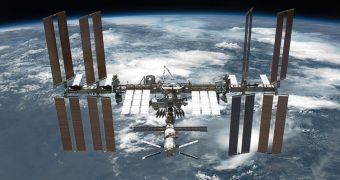Officials with the Russian Federal Space Agency (RosCosmos) say that they want the International Space Station (ISS) to be decommissioned through deorbiting at the end of its lifespan, in 2020.
All 15 nations involved in the $100 billion project decided to move forward with operations on the space lab for the next decade. However, they are aware that the football field-sized structure will have to be deserted at some point.
Russian experts say that the facility should be deorbited at that time. This would lead to it breaking up and burning in the Earth's atmosphere, while the remaining debris would scatter in one of the world's oceans. This approach requires modifying the station's orbit by using its thrusters.
A similar scenario was applied when the Russian-built Mir space station was decommissioned on March 23, 2001. It too was knocked off-orbit with the aid of a space capsule carrying a lot of fuel, and was then made to reenter Earth's atmosphere.
In the new announcement, RosCosmos officials say that this approach would ensure that the issue of space debris is not exacerbated even further. If the station remains in orbit, there is a chance that it will be heavily damaged by space junk.
Given that it has a mass of 417,289 kilograms (919,960 pounds), imagine the amount of debris that the ISS could turn into. RosCosmos deputy headVitaly Davydov told the AFP news agency yesterday, July 27, that such a scenario is unacceptable.
“After it completes its existence, we will be forced to sink the [ISS]. It cannot be left in orbit, it's too complex, too heavy an object, it can leave behind lots of rubbish,” the official said.
However, this plan may not come into fruition in 2020, other experts are saying. Partner nations in the project are already talking about extending the life of the outpost even more, by 2025 or even 2030.
The leaders of ISS “agencies from Canada, Europe, Japan, Russia and the United States met in Tokyo, Japan, on March 11, 2010 to review station cooperation and agreed there are no identified technical constraints to continuing the station operations to at least 2020,” Kelly Humphries says.
“The partnership is currently working to certify on-orbit elements through 2028. We will continue the technical evaluation and discussions with our international partners,” the NASA spokesperson told Space in an interview.
In principal, NASA has no problem with the Russian plan to deorbit the ISS once it reaches the end of its lifespan. Indeed, this appears to be the most elegant way of discontinuing the station's operations.

 14 DAY TRIAL //
14 DAY TRIAL //